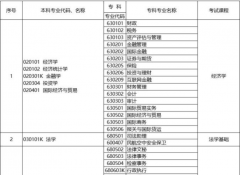


河南省专升本英语常用词汇辨析(一)(
11. alive, living, live
alive (表语性形容词)活着的,存在的
living(定语性形容词)生存的,有生命的 live 活的、有生命的
12. also, as well, too 和 either
also, as well和too的意思基本相同,都作“也”讲,但它们在句中的位置各不相同。either作“也”讲,但用于否定结构。
13. among, between
这一对介词都表示“在……之间”。 among 多用于三者或三者以上之间。如: He is sitting among the students. 他坐在学生之中。 between 则用在二者之间,常与 and 搭配。如: I am sitting between my father and mother. 我坐在父母亲之间。
14. amount 和number
amount意为“数量”,为不可数名词,如:the amount of (= as much as) 与……同量;number意为“数目”,为可数名词,如:the number of (= as many as) 与……同数。
15.answer, reply, respond
这三个动词均可作“回答”解。 answer 是三个动词中最常用的词,表示用口头或笔头方式作“回答”,可作及物动词或不及物动词。如: I cannot answer you right now. 我不能马上给你答案。reply 是较正式的“回答”用语。如:I sent in my application, and the university replied at once. 我递交了申请书,该大学马上给我答复。 respond 系正式用语,一般只作不及物动词。如: They did not respond to my invitation. 她们还没有答复我的邀请。
16. arrive, reach, get to
这三个动词词语均可作“到达”解。arrive 为不及物动词,表示到达某地,一般到达一个大地方用介词 in, 到达一个小地方用介词 at。如: He arrived in Beijing last week. 他是上周到达北京的。 We arrived at the station this morning. 我们今天早上就到了火车站。 reach 为及物动词。如: They reached London on Thursday. 他们星期四抵达了伦敦。 get to 比上面两词较为口语化。如: Would you please tell me how to get to the railway station? 请您告诉我去火车站怎么走?
17. appetite, desire
前者指“食欲、胃口”,后者指“欲望、愿望”
18. assume, consume, resume
assume接受,承担consume消费,消耗resume恢复
19. assure, ensure, insure
assure vt. 使……确信、向……确定,用来表示使别人消除疑惑而做的确定,后常接指人的名词或代词做宾语
ensure vt. 确定、担保、使……安全,用来表示使某事或某物有把握,后面可接名词或从句 insure vt. 给……保险,为……提供确定
20. base, basis 和foundation
这三个名词都含有“基础”的意思,但用法有区别。base 多指具体、形象的“根基、基地”,有时也可指议论等的“根据”。basis则多半用作抽象或比喻意义,指信仰、议论等的根据,引申为“……基础”。foundation可以替代base和basis,但它更强调基础的坚固。
-
报考二建需要社保吗
现代华西教育
-
学历提升教育机构排的状
现代华西教育
-
在职人员有必要学历提升
现代华西教育
-
提历报考什么专业比较好
现代华西教育






